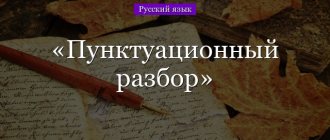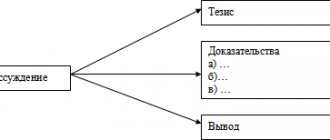Summary of a Russian language lesson in 5th grade on the topic: “Proposal”
Summary of a Russian language lesson in 5th grade on the topic:
"Offer"
The purpose of the lesson
: get an idea of the sentence as a syntactic unit; formulate the concept of citizenship as part of the study of a new topic;
Lesson objectives:
- Familiarize yourself with the definition of a sentence, understand the difference between a sentence and a phrase;
- Be able to compose a sentence grammatically correctly;
- Realize that you belong to the Great Country;
Lesson type
: combined
Number of hours to study the topic
: 1 hour (45 min.)
Forms and methods of work
: psychological training, creating a problem situation, teaching structures (Singapore method), work in groups, work in pairs;
Planned results and UUD:
Subject:
forming an idea of a sentence, honing spelling skills, updating knowledge about phrases and text styles;
Metasubject:
the ability to independently determine activity goals and draw up activity plans; independently carry out, control and adjust activities
the ability to communicate and interact productively in the process of joint activities, to take into account the positions of other participants in the activity;
Personal:
developing an understanding of Russian civic identity, patriotism, respect for one’s people, a sense of responsibility to the Motherland, pride in one’s land, one’s Motherland, the past and present of the multinational people of Russia, respect for state symbols (coat of arms, flag, anthem); the formation of a worldview based on dialogue crops
Material and technical base
: Russian language program for textbooks for grades 5-9 of secondary schools/T.A. Ladyzhenskaya, M.T. Baranov, L.A. Trostentsova and others - M.: Education, 2012, corresponding textbook for grade 5, screen with projector, illustrative material, handouts, soft toy for training, colored emoticons.
During the classes.
- Organizational moment (5 min.)
- Good afternoon guys. I hope he is truly kind to you. Despite the fact that it is deep autumn outside, I want something positive, warm, and uplifting. And to make your day brighter, I came today not alone, but with a furry friend. It was given to my daughter for her birthday. You also love this holiday, right? What do you associate holidays with in general? Take this animal in your hands, stroke it and say a word, the sound of which would immediately bring to mind some holiday, and pass the toy to your neighbor.
(psychological training
, aimed at general mood and motivation: students pass a toy to each other in a chain, while pronouncing words that they associate with the word “holiday”)
- Wonderful. I think you liked my friend. Have you met yet? What kind of animal is this?
(students make assumptions)
- This is a snow leopard, my dears. But in the family we call him Barsik. Remember where we can see the image of a leopard?
(on the coat of arms of the Republic of Tatarstan)
— Which country is our Republic a part of?
(Russian Federation)
- Absolutely right. Well done! Now let’s open our notebooks and write down the number.
- Updating previous knowledge (15 min.)
Training structure "JOT-TOTS"
(done in groups of 4)
- Guys, take 9 cards lying on your tables and write the words that you said during the warm-up, placing them in random order in three rows of three, then make up phrases with them. Make up a sentence using one of the phrases. Write everything down in your notebooks.
(students, working in a team, come up with phrases and sentences, then one of the participants, at the choice of the teacher, reports on the work done. There are 20 students in total, i.e. 5 teams)
- You did a great job! Discuss your work.
(students literally analyze the completed task and the work of each group member within 20 seconds)
- Studying a new topic. (15 minutes.)
- Creating a problematic situation. Voicing the topic of the lesson by students. Goal setting.
— Guys, I have the following question: was it more difficult to come up with phrases or sentences?
(students answer unequivocally that the proposal)
- And why? With what it can be connected?
(students presumably answer that more words had to be selected for the sentence, but there are only two in the phrase)
- Right. Let us remember what a phrase is. We talked about this with you in the previous lesson. Shoulder neighbors, share the definition with each other and rate the answers.
(work in pairs)
— Everything is clear with phrases. But it's not clear with the proposals. What is it? How is it different from a phrase?
(students make assumptions)
— We don’t know everything about the proposal. So maybe we can find out more? Do you agree?
- So, what will the topic of our lesson today be?
( "Offer")
- What will we have to find out? What is our goal?
(with joint efforts it turns out that this is the definition of a sentence, identifying the difference between a sentence and a phrase and the role of a sentence in speech)
- Working with the textbook. Educational structure "WRIGHT-ROUND-ROBIN"
- Find the definition of a sentence in your textbooks, write it down and tell it to your partners clockwise, from one to the other.
3. Working with a presentation (small, 3 slides)
1 slide.
- Guys, there is an image in front of you. Come up with phrases that would describe this picture.
(presumably: bare trees, a beautiful monument, etc.)
- Now come up with suggestions. In which case do you describe the picture better?
(in case of proposals)
- Think about what this could be connected with?
(with the fact that sentences carry more information, make speech expressive, rich)
- So, what role do sentences play in our speech?
(students answer that it is important, sentences help not only to express their thoughts, but also to understand others)
— My dears, what kind of monument is shown in the picture?
(presumably students find it difficult to answer)
— This is a monument to Kuzma Minin and Dmitry Pozharsky in Moscow. It is with their names and their heroic feat that the history of National Unity Day, which is one of the most significant holidays in our country, is connected.
2 slide
— At the very beginning of the lesson, it was no coincidence that I asked you to voice words related to the holidays. After all, holidays are different. And besides words such as “gift”, “cake”, “Christmas tree”, there are words “pride”, “Motherland”, “unity”, “heroism”, which also relate to the holiday. On your tables is a small historical note about the history of this holiday. Read and find sentences that express the main idea of the text and write them down.
National Unity Day in Russia is a public holiday celebrated annually on November 4th. Historically, it is associated with distant events of the early 17th century, when in 1612 Moscow was liberated from Polish invaders. It was on November 4 that the people's militia, led by the Nizhny Novgorod governor Kozma Minin and Prince Dmitry Pozharsky, successfully stormed Kitay-Gorod, forcing the command of the Polish army to surrender. Dmitry Pozharsky was the first to enter the liberated city with the sacred icon of the Kazan Mother of God in his hands. It was she, as they sacredly believed in Rus', who helped protect the Moscow State from the Polish invasion. In 1649, Tsar Alexei Mikhailovich issued a decree that November 4 is a public holiday, the day of the Kazan Icon of the Mother of God.
National Unity Day is an occasion for all citizens of the country to realize and feel like one people.
This is another reason to show our enemies that we are united and truly represent a force. Now in Russia National Unity Day is becoming more and more popular.
After all, pride in one’s Motherland, in its past and present, and faith in its happy future is what invariably unites people and makes them a single people. (students answer that the last paragraph contains the main idea of the text)
— Guys, what is the idea of the holiday? How do you think?
(children answer that this is the idea of patriotism, unity, the idea of living in peace and harmony, loving the Motherland)
- Absolutely right, guys. But you and I have two Motherlands: Russia and the Republic of Tatarstan. Small and big. Remember our Barsik, who appears on the coat of arms of Tatarstan. Who is depicted on the coat of arms of the Russian Federation?
(double-headed eagle)
- Physical exercise. ( 1 min.)
- Let’s stretch our wings, spread them, close our eyes, imagine that we are soaring under the clouds like eaglets, take a deep breath of clean mountain air and smile at the snow leopard lounging on the rocks. Have you rested? Amazing!
- Reflection (7 min.)
- And now, I think it’s time to find out what new and useful things you learned in today’s lesson:
(students choose to continue with the suggestions given by the teacher)
“And I would like to end our busy lesson with a wonderful poem.” Read it clearly, please.
(several students read one verse at a time, the text of the poem is on the screen)
The best in the world
Russian region, my land, my dear expanses! We have rivers and fields, seas, forests and mountains.
We have both north and south. Gardens bloom in the south. In the north there is snow all around - There is cold and blizzards.
People in Moscow are going to bed now, the moon is looking out the window. The Far East rises at the same hour, meeting the sun.
Russian region, how great you are! From border to border And a fast train straight through won't make it in a week.
The words are heard on the radio - The long journey is not difficult for them. Your familiar voice, Moscow, is heard by people everywhere.
And we are always glad to hear about our peaceful life. How happily we live in our native Fatherland!
Peoples are like one family, Although their language is different. All are daughters and sons of their beautiful country.
And everyone has one homeland. Hello and glory to you, Invincible country, Russian state!
— Wonderful words about a wonderful country. I think you also have something to turn to your homeland with.
VI. Homework and grading (2 min.)
— Please write a mini-essay at home about why you love your Motherland.
(for excellent and good students, the recommended volume is 7 sentences, for low achievers - 4 sentences)
- My dears, thank you for your work and, as always, please rate our lesson today by pasting a smiley face next to the item.
(On the desk:
- Interesting
- Healthy
- Usually
- Boring


